|
FAQs on Betta Diseases: Viral, Tumours, Cancer, Lymphocystis
Related Articles:
Betta Diseases, Betta Systems,
Anabantoids/Gouramis & Relatives,
Betta splendens/Siamese Fighting Fish
Improved(Better?) Products for Bettas!,
Related FAQs:
Betta Disease 1,
Betta Disease 2,
Betta Disease 3,
Betta Disease 4,
Betta Disease 5,
Betta Disease 6,
Betta Disease 7, Betta Disease 8, Betta Disease 9, Betta Disease 10, Betta Disease 11, Betta Disease 12, Betta Disease 13, Betta Disease 14, Betta Disease 15,
Betta Disease 16,
Betta Disease 17,
Betta Disease 18 ,
Betta Disease 19,
Betta Disease 20,
Betta Disease 21
Betta Health 22,
Betta Health 23,
Betta Health 24,
Betta Health 25,
Betta Health 26,
Betta Health 28,
Betta Health 29,
Betta Health 30,
Betta Health 31,
Betta Disease Causes/Etiologies:
Determining/Diagnosing,
Environmental (By far the largest cat.),
Nutritional,
Viral/Cancer, Infectious (Bacterial, Fungal) , Parasitic: Ich/White Spot, Velvet;
Senescence/Old Age,
Cures/Curatives/Treatments,
FAQs on Betta Medicines:
Betta Medicines period,
Antibiotics/Antibacterials,
Anti-Protozoals (Metronidazole, eSHa...),
Copper,
Formalin,
Malachite Green,
Anthelminthics,
Organophosphates,
Salts,
All Other Betta Med.s,
|

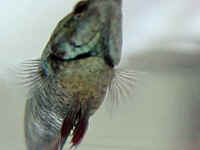
|
 |
New
Print and
eBook on Amazon
Betta Success
Doing what it takes to keep Bettas healthy long-term
by Robert (Bob) Fenner
|
|
Betta Question; attachment
11/1/18
Hi there. I have a few questions about my Betta fish, which reference the
attached picture.
Should I be concerned about
1. the fish's pale color,
2. the clumping at the end of the fins, or
3. the prominent bump near the end of the torso?
<Only the last semi-concerns me>
This fish was dumped off with me about 4 months ago. For about a year+ before
then he was kept in a very small, unfiltered fish bowl.
<Ugh!>
He's been moved into a 10 gallon, filtered, and heated tank that's changed about
20% every week. He's become a lot more active and eats regularly. Are any of my
concerns warranted?
<Again, not much appears "off" concerning this fish, considering its previous
care. I would do nothing in the way of treatment, environmental manipulation>
Thank you so much!
Shannon
<Thank you for sharing; glad to help. Bob Fenner>
|
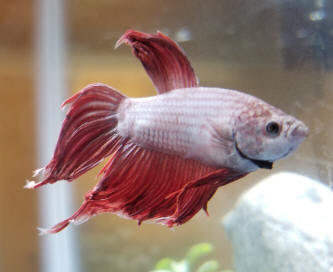
Re: Betta Question; attachment 11/2/18
WetWebMedia is an amazing website and I've just made a small donation.
Thank you, Bob!
<I thank you for your kind, encouraging words and donation. Cheers, BobF>
|
|
Possible Betta Tumor? 10/16/18
Hi guys
<Hello,>
I’ve been reading your page for a while and have managed to so far keep my three
beloved Bettas happy and content... a few months ago one of my boys however
started developing a black growth as you can see in the photo that is definitely
getting bigger...
I don’t know if this is a tumor or something treatable?
<Almost certainly not.>
He seems active and just as daft as always and the tank is testing normal,
regular changes and weekly tests etc all as they should be...
Is there anything I can treat him with or is it just a matter of letting him
carry on until his quality of life reduces and then letting him pass quickly?
<Precisely. Tumours and other sorts of growths, whether benign or malignant, are
not uncommon in Bettas. There's no obvious explanation beyond inbreeding, and
certainly no clear treatment. Often benign tumours cause no immediate problems,
and if your Betta is otherwise happy, I would not be overly concerned just yet.
Cheers, Neale.>
|
.jpeg) |
|
Re: Possible Betta Tumor?
Thank you for confirming what I thought - I really appreciate it!
<Welcome.>
Even when you think you know then knowing that you can’t do any more is
reassuring and to be fair most vets look puzzled when I ask them so it’s really
really appreciated. And thank you for all the fish guides! When I first got my
boys they were immensely helpful as I hadn’t had Bettas for about 15 years and
frankly I probably could have created better conditions for them last time
compared to the mansions they have these days ��.
Have a lovely evening!
Tinx
<Wow! Thanks for these kinds words, and taking the time to write us. We do
appreciate that. Hopefully your Betta will live a happy life, if not perhaps
quite as long as it might have otherwise been. Cheers, Neale.>
|
|
Betta has Bubble (Bob, please do review/expand as needed)<<Will do>>
6/16/18
Hello!
<Hello Shannon,>
I am writing about my Crown tail Betta "Mr. Spock" He has a reoccurring bubble
that keeps appearing on his left side. He doesn't seem affected by it. It just
appears. Then it pops. Then it usually takes a month or so for it to reappear.
However this last time the bubble popped 3 days ago and now its already starting
back up.
<Curious. Given that the abdomen is obviously stretched, and the skin and scales
consequently distorted, I think we can rule out gas embolism. If you recall, gas
embolism tends to occur in tanks with very high aeration levels, resulting in
supersaturation of the water with oxygen. The gas eventually bubbles out of
solution, potentially inside the fish, where it forms more or less transparent
bubbles just below the skin. Such bubbles are very unlikely to form in a tank
with minimal aeration and/or filtration, as is usually the case with Bettas.
So this means that some type of bacterial disease is much more probable,
causing the accumulation of fluids inside the tissues.>
I live in phoenix Arizona so I have very hard water.
<Not ideal for Bettas; do aim for soft to medium hardness water, 2-15 degrees
dH, pH 6.5-7.5 is about right. Do try mixing the tap water with a certain amount
of RO or rainwater; even replacing 25% of each bucket of water with RO/rainwater
will make a huge difference.>
Mr. Spock lives in a 1 gallon (I tried having him in a 5 gallon
and he almost died from stress)
<Honestly think your interpretation of events here makes no scientific sense at
all. One gallon of water is much too small for 'easy' Betta maintenance. Do
remember that breeders keeping them in jam jars are changing the water
completely every day, and in the wild Bettas are living in sluggish streams,
ponds, paddy fields, and so on. Contrary to myth, they aren't living hoof-prints
of rainwater! Fish aren't afraid of being 'out of their depth' and even a 50
gallon tank is minuscule compared to what a wild Betta would be living in. So if
your Betta looked stressed, the problem wasn't really the volume of water, but
the other aspects of the environment. Bettas need to be able to access the
surface easily, and strong water currents will prevent that, so ensure
filtration is gentle.
Air-powered filters are the ideal. They also appreciate shelter and cover,
floating vegetation being the ideal, because they don't really want to make use
of caves or plants at the bottom of the tank.>
with a heater (80 degrees) and a filter.
<Do review water quality. As always with fish, nine times out of ten problems
come down to water quality and chemistry problems, particularly the former. 0
ammonia and 0 nitrite are essential, even for Bettas, again, despite the myth
that they live in fetid swaps and can therefore survive without filters.>
He has black aquarium sand, a live plant, and a log. I do half tank water
changes every other day.
<Understood.>
Since this last bubble that popped I have given him an Epsom salt bath each day.
<Epsom salt will help with swelling, but I do think the underlying cause needs
to be address. Environment the most likely cause; bacteria the most
likely mechanism.>
Thank you so much for you valuable time!
Shannon
<Glad to help. Good luck, Neale.>
|
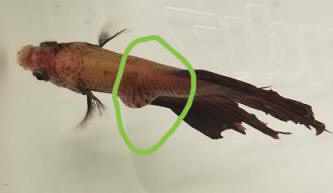
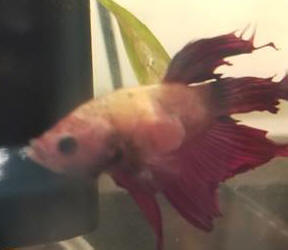 |
|
Super Delta Betta Fin Spot/RMF 4/9/18
Dear Wet Web Media,
<Hello Jacob>
I have read many of your threads on Betta diseases, but have been unable
to find anything that matched my Betta’s current predicament.
I had kept my Betta in a 2gal tank for ~6months, about a month ago I had
noticed the development of a white spot on his ventral fin. Initially I
attempted to treat it with API Bettafix (a natural treatment for
bacterial infections in Betta fish) which contained 0.2% melaleuca.
<Of no use>
After not seeing any improvement I tried using API Super Ick Cure, which
contains 1% PVP.
<Ditto>
This also did not seem to rid of the white growth. In the past two weeks
I transferred the Betta into a 5gal tank and have run a course of API
Fungus Cure, which contains Acriflavine. Despite these numerous
attempts, this white spot still remains.
The Betta is behaving normally and is eating well. The tank temperature
is a suitable 80 degrees F. I have included photographs of the white
growth that has split the Betta's ventral fin (note: the water is.
Yellow from the Victoria Green B in the fungal treatment). The tank is
regularly aerated and filtered. The Betta lives only with a Marimo moss
ball as company.
Let me know if there are any other variables to consider and what the
best course of action would be to keep my Betta alive and well
I look forward to hearing from you at your earliest convenience.
Thank you,
Jacob Lasci
<Very unusual to state, but your images are too small to see what you're
referring to. But I will state, as you mention your fish is fine other
than the split fin, I would not be concerned re the spot. Do send along
a larger pic file if you'd like/will otherwise, and cease these
treatments. They are more harmful than of use. Bob Fenner>
Super Delta Betta Fin Spot/Neale 4/9/18
Dear Wet Web Media,
<Hello Jacob,>
I have read many of your threads on Betta diseases, but have been unable
to find anything that matched my Betta’s current predicament.
<Oh?>
I had kept my Betta in a 2gal tank for ~6months, about a month ago I had
noticed the development of a white spot on his ventral fin. Initially I
attempted to treat it with API Bettafix (a natural treatment for
bacterial infections in Betta fish) which contained 0.2% melaleuca.
<These tea-tree oil products are not reliable; perhaps even harmful in
some situations.>
After not seeing any improvement I tried using API Super Ick Cure, which
contains 1%PVP.
<While a better choice of medication, a single white spot is unlikely to
be Whitespot/Ick, so this medication probably wasn't going to be
helpful.>
This also did not seem to rid of the white growth.
<Indeed.>
In the past two weeks I transferred the Betta into a 5gal tank and have
run a course of API Fungus Cure, which contains Acriflavine.
<Again, you're not dealing with a fungus, which can be characterised by
its cotton wool appearance.>
Despite these numerous attempts, this white spot still remains.
<Quite so; when it comes to using medications, much better to identify
the problem first, and then apply the right medication. The scattergun
approach to medicating sometimes 'gets lucky' but isn't really an
economical or useful way to approach things.>
The Betta is behaving normally and is eating well.
<Good.>
The tank temperature is a suitable 80 degrees F.
<And water chemistry? Water quality?>
I have included photographs of the white growth that has split the
Betta's ventral fin (note: the water is. Yellow from the Victoria Green
B in the fungal treatment). The tank is regularly aerated and filtered.
<Good.>
The Betta lives only with a Marimo moss ball as company.
<Also good.>
Let me know if there are any other variables to consider and what the
best course of action would be to keep my Betta alive and well
I look forward to hearing from you at your earliest convenience.
Thank you,
Jacob
<While I'm going to ask Bob Fenner for a second opinion here, my gut
reaction is that this is a typical cyst or tumour of the sort frequently
seen on Bettas. These are not necessarily malign or even fast growing,
and many Bettas have them for life. While Bettas can get Whitespot and
Velvet, these are usually easily diagnosed by the salt grain (Whitespot)
or icing sugar (Velvet) dusting presented by them. Glugea is another
parasite that produces small cysts on the body, but these spread quickly
and have a very dramatic appearance, like round nodules 1mm or more in
diameter. Anabantids are subject to Glugea, but it's rarely seen outside
of wild-caught fish. Lymphocystis is one last consideration, a typical
viral infection for fish that presents itself as off-white growths on
the skin. It's untreatable, but rarely fatal, and usually develops very
slowly, and then fades away even more slowly, if at all. Having
dispensed with these, the various cysts and tumours that Bettas are
prone to may be a result of inbreeding over the years, and appear as
pimples on the body where the pale skin pushes out between the scales.
These cysts are often small and discrete, but may, in more severe cases,
be part of a larger swelling within the muscles or even the abdomen.
Obviously these are unsightly, but if the cysts are small and away from
anywhere important, i.e., not blocking the vent or gills, then the cyst
does no harm. It may fade in time, but usually doesn't. Some aquarists
suggest there's an environmental or dietary triggering factor that
causes them. Bear in mind as air-breathers they're more exposed to
toxins in the air, such as solvents and paint fumes, than regular fish,
so they may be exposed to a lot more risk factors than we'd expect for a
fish. Others put the cysts and tumours down to bad genes. Hard to say.
But the benign cysts are very common in Bettas, and to a lesser degree,
so are truly malign tumours that spread and kill the Betta quite
quickly. Not much to be done with either, beyond good aquarium
maintenance. Cheers, Neale.>
|
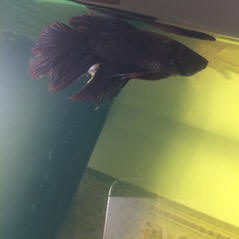
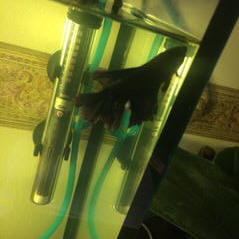 full size pix
full size pix |
|
Re: Super Delta Betta Fin Spot (Bob, second opinion?). Comp.
4/10/18
<<Nothing more to add. B>>
Thank you very much for the wise words Neale.
<Most welcome.>
I have been keeping up with weekly water chemistry tests (using paper strips).
Everything has been within the recommended guidelines for Bettas.
<Ah, that's good to hear.>
Sorry to bother you again, but I have a follow up question. Is it a bad idea to
get the Betta a few tank mates?
<Yes and no! More specifically, farmed long-fin Bettas are miles away from their
wild ancestors, and find it difficult to interact with other fish, whether
competing for food or backing off from territorial aggression. So yes, it's a
bad idea to casually mix Bettas with community fish because they're at a real
risk of starving or getting damaged. However, there are fish that simply ignore
Bettas, and conversely, Bettas ignore them. Benthic
fish are particularly good choices in this regard. Given sufficient space, I'm
sure you would do fine with the smaller Corydoras species, Whiptail cats and
Bristlenose cats. With a bit of luck, perhaps even very peaceful
schooling fish like Ricefish and Dwarf Rasboras.>
He is in a 5gal aquarium now.
<That's your limiting factor though: few, if any, community fish would be happy
in a tank this small.>
I have read articles suggesting that neon or ember tetras, loaches, rasboras,
and some Plecos make for suitable tank mates.
<Quite possibly. When it comes to Plecs for example, yes, anything goes because
they don't view fish as food, and even the most psychotic Betta isn't going to
have any impact whatsoever on these heavily armoured
catfish. Tetras, loaches, and so on are more of a gamble because these sometimes
harass Bettas, nip them, or steal their food. So the default advice is, apart
from Loricariidae, keep Bettas away from other fish UNLESS
you are sure the combination will work.>
All the best,
Jacob
<Cheers, Neale.>
|
|
Black Spot (Neale?) 9/13/17
Hello,
<Howsit Whit?>
I'm having a bit of a mystery with my Betta. He has this black mark on his head
that showed up in the last two months or so.
<Mmm; first off, I REALLY like your photos. Second, am really NOT liking this
spot>
He is in a 10 gallon heavily planted tank with neon tetras and Neocaridina
shrimp. Tank parameters are ph 7.4-7.6, ammonia: 0, nitrite:0, nitrate:0 (0
nitrate is normal for my tank due to all the plants).
<I see>
He did injure his tail a few weeks ago on something in the tank but that is
healing nicely. I don't recall if this showed up at the same time.
Do you have any ideas what it could be our if I need to treat it?
<This blackish area looks like a growth... perhaps a melanoma. Some folks might
advocate cutting it off... Am going to ask Neale Monks here for his individual
input. Thank you for sharing. Bob Fenner>
Thanks,
Whitney
|
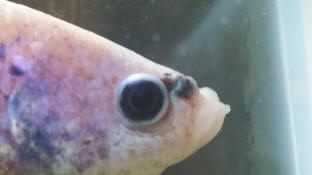
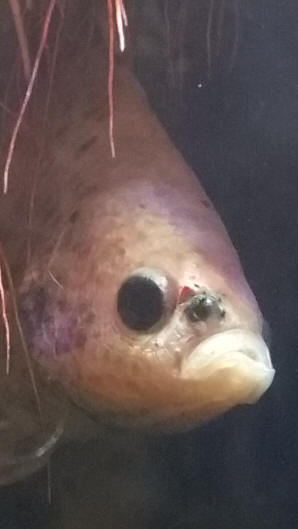 |
|
Black Spot, Betta, Neale's input
9/14/17
Hello,
<Whitney,>
I'm having a bit of a mystery with my Betta. He has this black mark on his head
that showed up in the last two months or so.
<Looks to me like less of a mark and more of a growth, blood blister, or some
other type of mass inside the nostril.>
He is in a 10 gallon heavily planted tank with neon tetras and Neocaridina
shrimp. Tank parameters are ph 7.4-7.6, ammonia: 0, nitrite:0, nitrate:0 (0
nitrate is normal for my tank due to all the plants).
<Understood.>
He did injure his tail a few weeks ago on something in the tank but that is
healing nicely. I don't recall if this showed up at the same time.
Do you have any ideas what it could be our if I need to treat it?
<Short term, I'd observe. Give a couple weeks and see if anything changes.
Perhaps run some antibiotics if you have them handy, as per Finrot, but likely
unnecessary so not a priority. If, after a couple weeks, the growth or mass is
smaller, then leave things be for another couple weeks. If it's
an actively growing melanoma or tumour, there's nothing to be done except
humanely destroy the fish as/when quality of life deteriorates. If it's a cyst,
it probably won't enlarge quickly, if at all, so there's no pressing health
issue to worry about. No treatment, either. Sometimes cysts heal under their own
steam, sometimes not. Vets can remove them from big fish (such as Koi) but it's
hard to imagine this being viable with a fish as
small as a Betta. If it's a blood blister, for example caused by hitting the
head against the glass when jumping, it should heal in time, just as with
humans.>
Thanks,
Whitney
<Good luck, Neale.>
|
|
Betta likely with virally mediated tumor that developed about four
months ago. 4/25/17
<Possibly a tumour, in which no real treatment, but...>
Did ok in healthy 10 gallon by himself. Heater, filtered, stable water
parameter. Though after about a month with tumor on left side, his "belly" began
bloating as well. Also did ok, even with bloat for about a month.
But now he is getting much more bloated, losing some color, having more
difficulty maneuvering to feed, and even "missing" food as he tries to strike at
surface, as if he's having some vision problems too.
<I'd be trying the old Epsom salt treatment first, ideally alongside an
antibiotic, in case this is some combination of constipation and Dropsy. These
are quite common among Bettas.>
Last ditch effort it was recommended that the belly swelling could be separate
issue caused by too much feeding, now that he's less active these days. Tried
reducing food to three Hikari pellets a day for two days.
<See, the thing is that even offering fewer pellets won't fix constipation,
because it's the dried, processed food that causes the problem. Much better to
use Epsom salt (a mild laxative for fish) alongside something like cooked peas
(if he'll take them) or if that fails live/frozen Daphnia or brine shrimp (more
readily taken, but less effective than plant food). Do see WWM re: the use of
Epsom salt and laxatives, here:
http://www.wetwebmedia.com/fwsubwebindex/gldfshmalnut.htm
Although this applies to Goldfish, the basic idea holds for any/all aquarium
fish. As with humans, there's a strong correlation between inactivity and
constipation. Fish that cannot swim much, whether because of lack of space, lack
of greens, or some type of inbreeding are especially prone to this problem.>
Then fasted for a day. Then three more days with only two or three pellets..
Someone recommended/ commented that he should be fasted " much" longer.?
Please.. How much longer? And could fasting really have any chance of clearing
his belly bloating.?
<See above. Fish can go without food for weeks, so starving is not a major
problem. Cheers, Neale.>
|
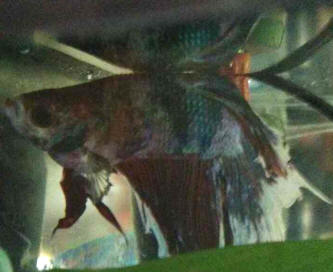
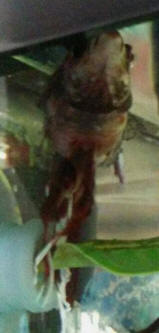 |
|
Betta Fish Help 4/21/17
Good Evening,
<Toni>
I need help identifying what is wrong with my fish. He's about 2 years old,
an his "breed" is called an elephant ear Betta. Tonight as I went to feed
him, I noticed he was swimming weird and his right fin was barely moving,
then I saw it... this growth coming from it, there's also a small
one near his tail.
<I see these... granulomatous tumors>
Please see attached pictures and let me know if it's something that is
serious or can be fixed with drops in his water. Currently he's in a 2
gallon heated tank. There is no other discoloration on him, the only weird
looking things are the growths, sorry if the lighting isn't great!
<... Please read here:
http://www.wetwebmedia.com/fwsubwebindex/BetDisViralF.htm
IF this is what it appears, only improved nutrition and environment can/will
extend this fish's life. Bob Fenner>
|
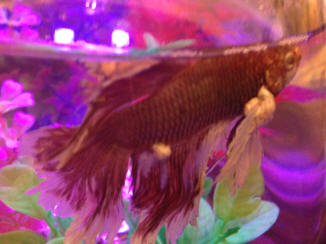
Re: Betta Fish Help
Thank you.
<Welcome>
|
|
Betta has bloated belly..
4/1/17
He's in healthy, cycled tank.. Bloating began two months ago with lump on side,
now belly is swollen too. Alone in ten gallon. Almost two years old.
Weekly 50% water changes. Treated with antibiotics in water column for 10 days,
then mixed with food for five. That was a month ago with no
improvement. Eating heartily still.. But much less active.. Some trouble
swimming too.. Upright. But struggles with turns because of swollen tummy..
Only thing I hadn't tried was treating for parasites. Tried PraziPro 5 days
ago.. Seems this "might" have reduced swelling a bit.. More PraziPro?
Different method of treating for internal parasites? Don't like treating without
knowing for sure, but no access to bio lab, and poor thing slowly going downhill
either way.. Advice?
<Reads like a (virally mediated) tumor. Please read here re:
http://www.wetwebmedia.com/fwsubwebindex/BetDisViralF.htm
No real treatments known. Bob Fenner>
Betta has bloated belly: Continued
4/2/17
Thank you, but so sad to read your advice this morning that the lump and
subsequent swelling in the poor guys belly is likely caused by a "*viral
mediated tumor*," and therefore un-treatable.
<Well, one can only hope; and I really hate to give up... but neither am
I liable to candy coat a situation. You COULD try the Epsom Salt,
Iodide-ate et al. treatments gone over where I referred you... But the
likelihood of
positive results is not good>
He's such a fighter. Was really hoping my final effort to treat for
internal parasites might possibly help, though I "haven't" had much
confidence in the possible effectiveness of such treatment given his
condition. This now leads me back to focusing on my sadness and concern
that he may be suffering terribly.
Someone gave me the advice that since he's eating it's a good sign, and
specifically states, "he won't eat if he's in pain." That advice was
comforting, but is she correct?
<Not in my long experience w/ Bettas... they will literally take food
till they're dead>
His quality of life is "definitely" reduced. Difficulty swimming. Mostly
just sits on his Betta leaf. No bubble nest for over a month. Only swims
off leaf to come over and eat, then right back to leaf.. Swims back and
forth from leaf to floating plants several times a day, and even though
he's a lone Betta, in his own ten gallon, he rarely explores anymore.
Mainly just stays in 8 inch radius at top left corner of tank. Once
every couple days he'll actually venture to his big castle he used to
love and hide in its caves. But that's it. :( Are you familiar with any
studies that have concluded, one way or the other, how fish feel and
think?
<Yes; have read quite a bit re>
Their capacity for such things? So far the opinions on this topic vary
widely. Often diametrically opposed. One group believes they are truly
aware and very sensitive creatures (where I'm feeling I fit in,) or the
other camp emphatically promotes the belief that they feel and think
practically "nothing," therefore "no need to stress over that hook in
their mouth fishermen, enjoy your hobby!" Haven't seen much middle
ground.
So I ask; what is "your" belief? I'm asking because this poor guy is
hanging on for so long. Over two months since lump appeared, and about
"one" month now that he's been struggling with the additional swelling
in his belly and decreased activity/lethargy. Is he suffering? How much
is "too" much?
<Hard to gauge>
and how long might he actually continue in "this" condition?
<Months more>
Because if he's "not" suffering, maybe this isn't so bad unless his
condition worsens. And in conclusion, I've read quite a bit on the sad
topic of euthanizing fish :( With the belief, that if necessary, I
desperately want to know how I can help end his suffering, though I'm
honestly not sure I could do it myself, nor trust anyone else to, but I
somehow "need" to summon that courage and strength if it goes that
direction. I bought Eugenol @ local drug store. Red Cross Brand was the
closest I could find to what I believe to be the right product. 85%
Eugenol
15% sesame oil. Is this okay?
<Yes; a favored material here>
couldn't find 100% Eugenol. And further, I've just read, that because
Bettas are strong, "and" because they are able to breath some air as
labyrinth fish, they can sometimes struggle desperately, and visibly
appear to suffer horribly from the process :( Fear of this compels me to
ask if MS-222 (Tricaine methanesulfonate) would be the best
way to go?
<Mmm; not necessary, recommended... and difficult for the general public
to acquire>
From my research it appears MS-222 is a "true" anesthetic; not some
improvised substance used to reduce "toothache" pain :( Though I feel
for "everyone" who loves their pets and are doing the best they can to
end
such suffering, and I feel this clove oil is likely one of the most
humane methods I have learned of, I think I may have found the "truly"
best way to carry out this sad responsibility if it becomes necessary.
Please share your thoughts regarding, (1) How long might he last in
present condition."
(2) What are "your" beliefs regarding how aware fish are and what they
think and feel? (3) How much is "too" much? and (4) "Should" I order the
MS-222 to be best prepared for if that time comes, and put that clove
oil
in the medicine cabinet to use for any future toothache pain, since that
is the purpose it is produced, marketed, and distributed for?
Thank you in advance.
Sincerely,
Betta Friend
<I would have you read Neale's piece re here:
http://www.wetwebmedia.com/euthanasia.htm
Bob Fenner>
|
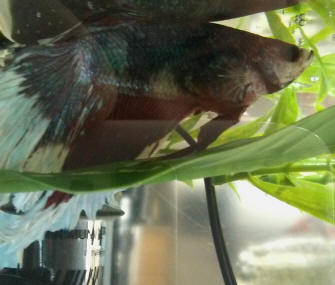
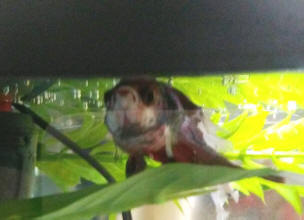 |
|
Betta has a growth, 4 megs, no rdg.
2/25/17
This has been growing on my Betta for a couple months now. I
recently put him in a 3 gallon tank with a filter. He was originally in a
1.5 gallon bowl with just a heater. I have tried lifeguard
all-in-one and fungus cure.
The lifeguard looked like it was working, the white spot was turning black.
But when I stopped the treatment as directed on the package, it came back
with a vengeance. It has a pearly white shine and looks like a blister about
to pop.
<Likely a tumorous growth, exacerbated by environmental
stress/pollution.
Not much can be done at this point but hope.
READ here:
http://www.wetwebmedia.com/fwsubwebindex/BetDisViralF.htm
Bob Fenner>
|
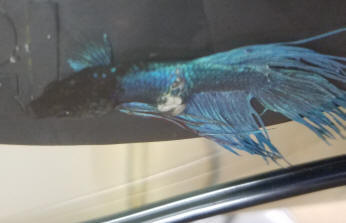
|
More re Betta Tumour
2/27/17
Please.. Realize you may not have replied last night, as it was getting
later when I sent messages about problem opening your message.. But im
terribly anxious to learn if there's anything I can do for "Finny." refer to
previous messages.
<Please re-read prev. corr.>
It's been a terribly stressful couple of weeks since lump first appeared.
:( don't know if im imagining, but at times it looks like his "opposite"
side may have a bit of swelling too. But more forward on his body? And of
course the ever so slightly raised scales, just over the immediate location
of lump, or "lumps" if im not imagining the effect on opposite side of body.
Also concerned that i used that 7 day course of
Kanaplex antibiotic, only adding to water. Would it work if I needed it
"again?" this time mixed with food?
<Not likely; no. Read where you were referred>>
Only reason I didn't mix with food initially was because no one could
describe how you could accurately dose him, without "over dosing" him by
adding it to food :( the KanaPlex is incredibly concentrated. Please email
reply. Text just didn't seem to work properly. Thank you.
<Can you not see our messages? Bob Fenner>
Subject: 2/27/17
These pictures to show body shape on other "right" side of body.
<Same resp.>
|
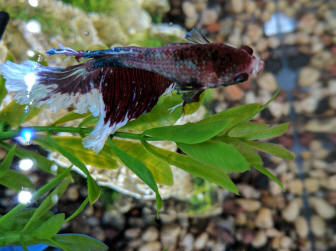 |
Lost in space Betta, Tumour
2/28/17
:( Again. Massage I received:
"Additional media content is included. Please check the message in detail."
Thank you, but please, if possible, please email reply.
<Ahh, I see. Cheers, B>
Subject: 2/28/17
Please email your reply/message. Trying to figure out problem with phone not
showing message/instructing me to "check message in detail" problem, but
having difficulty finding resolution. "Finny" may not have time for me to
learn how to reconfigure this phone..Thank you.
<Corr. accruing here:
http://wetwebmedia.com/FWSubWebIndex/fwsubwebindex.htm>
Subject: 2/28/17
Seems like you're trying to send me "something" in reply to my questions
about "Finny" and his health problem. But I keep getting the following
strange message: "Additional media content is included. Please check the
message in detail." this is third time you replied, and third time I got
that message. Can't open it in any fashion :( my text messaging service is
working for all messages and pictures everyone "else" is sending... I just
wish you could send it to my email address instead.
<READ here:
http://wetwebmedia.com/FWSubWebIndex/fwdailyfaqs.htm
Subject: 2/28/17
So sorry.. I obviously should have read instructions. Expected you to reply
to my cell or email, when all along to post replies to WetWebMedia forum..
<.... we reply to the querior, then post all later to the site>
Sorry for time, confusion, and frustration. Still hope to find help
regarding poor Finny and his lump/illness. Ill thoroughly read instructions
and search site for anything you've already posted before bugging you again
though.
Sincerely, John
<Please JUST read where you've been referred to. B>
Subject:
Betta tumor again.... 2/28/17
Ok... Got site figured out now.. So sorry I didn't read instructions before
requesting your valuable help. I now realize your responses will be posted
on site, not sent directly to "me." but now, going back, even under
accumulated faq's, it appears too late, and I missed whatever you may have
posted. It's killing me to think you might have provided me with the info
I've been desperately seeking for weeks to save my little buddy "Finny."
So I'm pleading with you.. I'll re-submit my request for help here. And I
assure you, I'll be searching properly for your reply on this site.. Here
goes:
Please help/advise.. 18 month old male Betta "Finny" has lump on left side..
Shown in picture just behind his pectoral fin.. Finny lives alone in heated,
cycled, filtered, ten gallon. Water parameters are 0 ammonia, 0 nitrites,
low/acceptable nitrates due to weekly 50% dechlorinated water changes. Temp
@ 79. PH 8.2. Lump appeared virtually overnight two weeks ago. Hasn't grown.
Treated with 7 day course of antibiotics "Kanaplex" with no change. Appetite
great. Swimming normal. A bit less active than normal.
Hangs out in floating plants more than usual. Please advise. "Finny" is
special pet.
<See WWM; the Freshwater Daily FAQs... Responses are archived there for
now... B>
Re Betta Tumor... nonsense
3/1/17
Took screen shots of "Bob Fenner postings. Cruel.. Hurtful.. Mainly that they
distract me from helping my pet.. "Lost in Space!?" Now I've made many mistakes
in life. You jus. t made a s***** one. Please Rectify it because I'm only angry
and I don't want to spend more time I need to spend on my poor sweet friend.
<Mmm; not you lost, but the msg. Read all again>
|
|
Tumor on Betta 12/26/16
Hi Crew,
My 2 year old plakat Betta Raji has developed a tumor (cyst, abscess?) at the
base of his right ventral fin. In the photos it is the dark mass
appearing to hang down at the base of his throat.
<I see this in your excellent pix>
The tumor appears to be growing within the fin base and is the same color as the
body. The growth is about the size of a baby pea. I noticed his ventral fin
getting fuller, but thought it was normal. I did not notice the severe
enlargement until today. I have been distracted by the serious illness of
another family member for the past few weeks, so I don't know if
it happened overnight or over the past few weeks.
Raji is in a heated, cycled and filtered 3 gallon tank with driftwood and a live
Anubias. I change his water every 5 days (50% in two stages over 30 minutes to
minimize stress). He normally eats a combination of Spectrum pellets and frozen
brine shrimp, although lately, he has refused the pellets and will only eat
brine shrimp.
Ammonia and nitrite are both zero and nitrates are around 5 ppm.
Raji is active although his appetite is not as robust as in the past.
Do you think the growth is a tumor or could it be some sort of an infection,
parasite or cyst? The tissue over the growth is the same as the surrounding
healthy tissue and is not discolored in any way.
Thank you for any suggestions or insight you may have into my little guy's
strange growth.
Susan
<I do have a suggested treatment mode here. It involves three approaches:
1) The administration of iodide-ate to the water directly; via a commercial
product for marine aquarium use... an example:
http://www.seachem.com/reef-iodide.php
administered per the instructions for whatever product you end up using...
Daily for three days then stopping for three more; then re-administering the
same>
2) The application of a quarter tsp. of Epsom Salt to the water (dissolved
first), and its replenishment with water changes.
3) The soaking of foods in a vitamin et al. supplement; an example here:
http://www.seachem.com/vitality.php
This done every feeding for a few minutes before the food is offered.
I suspect this tumor is related to the equivalent of the thyroid of higher
vertebrates; and these steps will hopefully bring about a reversal of this
tumor's growth. Bob Fenner>
|
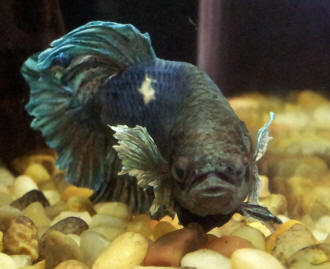
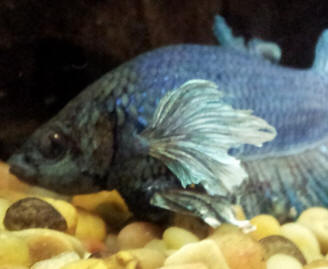 |
|
Re: Tumor on Betta 12/26/16
Thank you Bob!
<Welcome Susan>
To clarify, do I choose just one approach (for example, administering Sea Chem
Iodide to the tank) or do I combine all three?
<All three; these treatment moda are all "mix-able">
If I am to only choose one approach, do I continue the product until the growth
is gone, or as in the case of the Iodide, only administer for the two doses?
<The iodide for just the two dosage series, the others for a month>
In the case of the Vitality, can it be used until the tumor is resolved?
<Yes; like human supplements, very safe to augment nutrition>
Same with the Epsom salts addition to the water change?
<I would only use the MgSO4 for a month; dilute through water changes after>
Thanks again,
Susan
<Clarity is pleasurable; sorry for its lack here. BobF>
|
Gill tumor response 3/5/17
Hi Bob
<Susan>
I emailed you back in December about my 3 yr old placket Betta who has a
tumor. Tried the iodide treatment and continuing with the supplement you
recommended but as you can see in the photo there has been no
response.
<Unfortunately, there is very low incidence of improvement in these matters>
Raji is still eating and actively swimming about but when at rest he leans
to one side. There is no sign of secondary bacterial infection nor breakdown
of tissue. Scales are normal. The right ventral fin has completely
disappeared into the tumor.
Do you recommend repeating the iodide treatment?
<Yes; I would>
I treated for 2 gallons but the tank is closer to 3 (gravel substrate and
driftwood with live plants take up some of volume in the Fluval tank). I'm
attached to the feisty little guy and want to keep him as healthy and
comfortable as long as possible. The tank is cycled, heated, filtered and
all water parameters are excellent.
Thanks again for your wise advice.
Susan
<I feel like a very olde timey oncologist here... I wish you and your Betta
well. Bob Fenner>
|
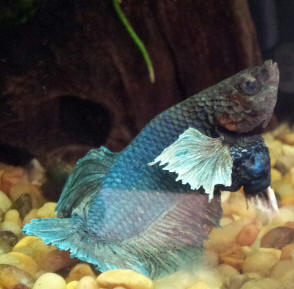 |
|
|
Betta with large wound and fin rot
8/19/16
Please could you help me.
My Betta looks awful. I am really afraid.
I have had him for 5 months, and it seems like he has had Finrot that
long.
<Mmm>
He developed this lump on his right side. Under the lump it looks like
an open wound. Now there is a big hole in his fin under that.
<I see this in your next -sent pix>
He is in a 10 gallon tank.
It has a filter and a heater.
The heater registers 76-78 degrees on glass thermometer and 82-84
degrees on the tape.
Daily AP Master Test Kit done daily -Normal
Ammonia 0, Nitrites 0, Nitrates 0,
<Zero NO3? Lo dudo. I'd have your water tested w/ another kit>
PH high- 7.8-7.4
Water conditioner- Prime
I do 25% water changes daily with partial gravel clean.
<I'd do these changes just weekly. Daily is too much... change,
disruption>
Eats well - Hikari Betta Bio-Gold 4-5 tiny pellets 2x day
Snack -Betta Dial-A-Treat 1-2 pieces of Mysis or Daphnia, or Blood Worms
every other day
Swims-well
Very personable
Breathing-good Gills good- I think
No PopEye, No swim bladder, no pineconing
I have tried Aquarium salt, Indian almond leaf, Metafix, <Melafix> and
KanaPlex. These are what I am using currently, all except the Metafix. I
am so afraid of hurting his liver or kidneys with all this stuff.
<You are wise here>
He has a few live and silk plants, cave and Betta hammock leaves.
Please if you have any other suggestions, I would greatly appreciate it.
I don't know if this is a parasite because it seems the antibiotic
doesn't work, and he is looking sicker. All the Pet store staff act like
"well he is only a fish." But he is a living.
Thank you so very much.
Christine.
<Your description covers most all the probable issues that folks have w/
environmental, nutritional causes of Betta trouble. Am inclined to
(unfortunately) suggest that this particular specimen may have a weak
genetic constitution. Betta splendens, like many other popular
freshwater tropical fishes, aren't "what they used to be" from so much
inbreeding. I'd try adding some good quality carbon to your filter;
adding a bit more/changing some out every month or so. There may be
"some chemical" issue here... that isn't mal-affecting the plants... and
am hoping the carbon may remove it. I do hope this helps. Bob Fenner>
|
 |
|
Betta with lump, hole, and fin rot
8/19/16
I just sent you an email asking if you could please help me. I forgot to
include a picture.
Thank you so very much,
Christine,
<I'd like to add two further suggestions: I WOULD dose this fish's water w/
an iodide-ate supplement
like this one:
http://www.seachem.com/reef-iodide.php
in case this is a I2 deficiency issue... and lace foods (soak them ahead of
offering) in a HUFA, vitamin supplement like this one:
http://www.seachem.com/vitality.php
Cheers, Bob Fenner>
Re: Betta with lump, hole, and fin rot; invoking deities
8/20/16
Dear Bob,
Thank you so very much for answering me so quickly.
I truly appreciate you and your advice.
I will do what you say.
Thank you.. And may the Lord God Almighty bless you, grant you and your loved
one's needs, and give you peace of mind and heart. I ask this in Jesus Christ's
Name. Amen.
Have a great weekend.
Yours truly
Christine
<Will accept kindly your good wishes. Not a fan of invisible friends however.
Cheers, BobF>
|
Betta with Lymphocystis 6/20/15
I am pretty sure my Betta has Lymphocystis based on the photos I've seen.
He's around 3 years old.
<Old for the species>
Is this something that could develop with age?
<Mmm; is more common with older specimens; ones in long-term poor settings (too
much wastes, nutrients, vacillating temperature...)>
I haven't changed his food, added new plants, or done anything else to change
the routine. He is in a one gallon tank and I change the water weekly.
<.... is this system heated, filtered?>
I add water conditioner. It seems to be spreading from where his tail connects
to his body down the tail fin. I know there's nothing to do for it, but I am
just wondering if it could be something else, or just old age?
Vicki
<Improve the environment and nutrition (READ on WWM RE) and improve this
animal's health. Bob Fenner>
|
HELP! sick Betta - don't know what it is! The usual, env. to
viral issue, no rdg. 3/10/14
Hello Crew!
<Howsit Hollie?>
I'm really not knowledgeable about fish at all, but my two daughters wanted
Betta fish. I got them each one - in their own fishbowls. When
we got them about a year ago, the store didn't stress any importance of
getting a HEATED fish tank - he said "this large bowl would be just
fine." So, they have been doing fine for about a year, except
for one of them just
recently.
<... and now>
So here is the story:
- he lives in a large fish bowl - with one plant and gravel/rocks.
<... NEED filter, heater...>
- he got very swollen about a couple weeks ago - mostly on the left side.
The only thing new is we added a little aquarium "tunnel" in the bowl and I
thought it was from the new tunnel - so we changed the water and threw that
decoration out.
- he then seemed a little better - but the last week I've noticed less
swelling but now a whitish/yellowish abscess on the left side (Photo 1) and
now he is losing color in his body (Photo 2 shows this more) , seems
lethargic, and not eating well the past few days.
- we've changed his water a few times, and today I threw out the rocks and
the plant that was in there, thinking there was some fungus in his bowl.
Now just has nothing but fresh water with those special drops that get out
the chlorine.
So, I've enclosed 2 photos - can you give me any solutions?!?! Help -
I have NO clue what to do, despite all of my reading this past day and a
half!
Thank you so much!
Hollie
<... Read here:
http://www.wetwebmedia.com/FWSubWebIndex/fwlvstkind2.htm
scroll down to Betta systems, viral FAQs. Bob Fenner>
|
.JPG)
.JPG) |
|
Betta with cyst/ulcer/something?
2/10/14
Hi, I was hoping you could help me with my Betta.
<Will do my best; as always>
Starting in November 2013, I noticed some small white bumps near his
gill.
<I see these in your excellent photographs>
His gill was slightly raised at this time. They disappeared and I didn't
notice anything again until January, when I saw a larger white spot had
appeared and the area around it looked a little swollen. It's gotten
larger in the last week and a half, and at that point he was noticeably
lethargic.
I didn't see anything quite like it in all my research, but I diagnosed
it as an ulcer/bacterial infection
<A reasonable guess>
and started treatment with Kanaplex.
<Okay; worth trying>
Yesterday was his 3rd and final dose and he seems to be feeling slightly
better. That white place has started to flake off, it looks like. (see
last pic) He's also been a bit bloated looking. He's still not quite
himself, even though his color is still bright and has a good appetite.
<Good>
I didn't think it was Lymphocystis because it didn't have that
cauliflower, lumpy look to it. Any idea on what exactly this is, and
anything more I can do for him?
<Mmm, just "the usual" optimized, stable conditions, good nutrition...
Do see/read on WWM re the last:
http://www.wetwebmedia.com/FWSubWebIndex/betfdgfaqs.htm>
He's in a 5.5 gallon tank heated to 80 degrees, I use Seachem prime
conditioner and he eats Omega One pellets. He gets a 50% water change
each week. I've had him about 8 months.
Thanks,
Sara
<Welcome. Bob Fenner>
|
 |
Betta Splendens fin problem 1/12/13
Hi Crew
<Hi, Gord! Sabrina with you again.>
I'm wondering if anyone can tell me what the bulge is on our male
Betta's ventral fin please? It is swollen like a pea. He has had a
little greenish spot there as long as I can remember but it was that
exact area that swelled up. It was first noticed about a week ago.
<I've looked at the photos you provided via Flickr.... This is
probably a tumor or cyst of some sort. Fish can get them just like
people can.>
The setup is a heated (to 28C) 19 litre planted tank with a mature 200
LPH filter with spray bar, angled at the aquarium wall to reduce
current. The system has been in place for about a year and a half and
the Betta has been the only inhabitant, except for a few snails that he
seems to enjoy sucking the flesh from. They don't last long!
<Heh! Sounds delicious. Seriously though, this is an
excellent setup.>
First a bit of history - we had noticed that his caudal fin was looking
more ragged than normal, again, about a week ago and it looked a bit
more iffy than I'd have liked so we treated with eSHa 2000. It was at
this point we also noticed the growth. I tested, since obviously fin-rot
is a massive red flag and the parameters were:
NH3/NH4+: 0
NO2: 0
NO3: 5ppm
pH: 6.8KH: not tested GH: not tested
<All good.>
I waited just in case it might have been something the eSHa 2000 could
have treated, in addition to the fin-rot. Obviously not, since the bulge
is still there. The fin-rot is clearing up nicely though, thankfully.
<Very good.>
Today's parameters were as above, in addition to a KH of 2 and a GH of
4.
<Still good.>
I also got a result of 0.25ppm NH3/NH4+ on an API liquid test kit. I'm a
bit surprised at that, since I haven't seen any ammonia in this tank for
a long, long time. Looking at the active ingredients in the eSHa 2000,
though, I see that two of them are compounds that both have two amine
functional groups each so I'm wondering if this might be throwing a
false positive.
<Although that's possible, it's also possible that the medication may
have interfered with your bacteria, causing the tank to cycle.>
Weekly water change is a Friday, so the full dose is in there still.
(Neale, I know you use this medication, have you had any experience of
false positives while using it?)
<Oh! Shoot! I should have stuck this in his box. Well,
I've almost finished, so I'll do that anyway and still send this
response.>
I've put a few photos of the growth on his fin up on Flickr to give you
a better idea. The link is:
http://www.flickr.com/photos/57278801@N04/sets/72157632487552355
<For what it's worth, it is possible to anesthetize a fish and cut a
piece of fin off. We do this in the lab, often, to get DNA from
our fish without harming/killing them. We are always cautious to
get only enough for a good sample, and never enough to make the fin
bleed, and our fish always come out of it seemingly oblivious to what's
happened. If this growth were right at the end of the fin, I would
consider removing it, but where it's located, I think I would just leave
it be, unless/until it becomes necessary to the well-being of the fish
to take action. If he's still swimming well, and still acting
well, and still sucking those snails out of their shells, I think I
would leave him alone, and maybe give him a fitting nickname....>
Thanks for any help you can give.
<Glad to (try) to help. I'll toss this in Neale's box, so he can
hopefully respond to your specific question about the eSHa 2000.>
Cheers
Gord
<Best wishes always, -Sabrina>
Re
Betta Splendens fin problem 1/12/13
I also got a result of 0.25ppm NH3/NH4+ on an API liquid test kit. I'm a
bit surprised at that, since I haven't seen any ammonia in this tank for
a long, long time. Looking at the active ingredients in the eSHa 2000,
though, I see that two of them are compounds that both have two amine
functional groups each so I'm wondering if this might be throwing a
false positive. Weekly water change is a Friday, so the full dose is in
there still. (Neale, I know you use this medication, have you had any
experience of false positives while using it?)
<Short answer is no, but then, I rarely test water these days. In any
event, I tend to avoid ammonia test kits and use nitrite test kits
instead.
These still reveal water quality problems, but they're less likely to be
affected by false positives (chloramine, amine groups on other
molecules,
etc). Cheers, Neale.>
Hey, Neale....
I just answered a question from Gordon Keenan regarding a Betta.
Toward the end, he addressed a question to you; had I noticed, I'd have
just dropped it in your box, but was nearly through it anyway, so just
finished.
I've placed it in your box now, in case you wish to answer it. The
title is "Betta Splendens Fin Problem".
My apologies!
Best wishes,
-Sabrina
<Thanks Sabrina; did see, have added a comment re: eSHa medication.
Cheers, Neale.>
Re: Betta Splendens fin problem 1/14/13
Hi Neale
<Gordon,>
Thanks for that. I see where you are coming from regarding ammonia vs.
nitrite testing. Unfortunately I'm Scottish, so if I bought the
ammonia kit, I'm flaming well sure I'm going to use it!
<Fair enough. But if the fish seem happy, and nitrite is zero, then I'd
be tempted to ignore, or at least downplay, the ammonia test kit
result.>
I tested the next day and NH3/NH4+ was below detection limits, so it was
either my eyes or sample contamination. I wish I'd done a nitrite at the
same time, though, to see if it was cycling through. Nitrite is my most
neglected test since I tend to focus on the start and end products of
the N cycle. Ah well, I've gained an object lesson in the usefulness of
it.
<Indeed.>
Cheers, Gord
<And likewise, Neale.>
Betta Splendens fin problem - II - 01/15/2012
Hi Sabrina
<Heya, Gord!>
Are you not sick of me yet?!
<Are you kidding? Terribly! Actually, no, not at all.
Your emails are a pleasure.>
Thanks for the response. It's a bit of a relief that I don't have to do
anything, yet, at any rate. Medicating fish terrifies me, let alone
cutting bits off their fins, and this one, especially, is more of a pet
than any of the others we have. He's a brilliant, intelligent,
personable, aggressive little killing machine and we love him as much as
the cats. We like aggressive little killing machines in this house!
<Heh! Why do I see Protopterus in your future?>
Hmmm, could be interference with the filter although the instructions do
say it is safe to keep bio-filtration in place during treatment. They
say that, but it is a bactericidal formulation, so I'm taking it with a
pinch of salt and I think it contains copper sulphate.
<Yeah, that can doom your bacteria.>
Wifey-o is sleeping and the medication is in the bedroom, so I'm not
risking the wrath to double check, but there is definitely a Cu
compound, anyway. If I remember correctly CuSO4 pretty much nukes any
aquatic life at a fairly small concentration, but the higher the life
the more tolerance. I read some case studies back in college to do with
downstream areas from pig farms (high copper demand in food, high copper
output in effluent) and they were quite alarming on the invert and algal
populations within the plume.
So, like I say, a pinch of salt.
<I think your thought process is quite sound, and, yes, copper is toxic
to aquatic life. Fortunately for fish, it's more toxic to
parasites than it is to vertebrates. But once you start playing
with shrimp, please be certain not to let this or any other
copper-containing drug come into contact with the shrimp or their water
(or decor, substrate....).>
I spoke too soon on the fin-rot. The ventral fin is now showing some
holes and raggedness on the edges, nothing extreme but it's there,
despite medication.
<Damn....>
I've seen you mention more than once that when fin-rot hits a Betta
they're basically plagued by it for life.
<Can be. Those long, flowing fins (which are selectively bred and
unnatural) that we think are so pretty do come with their own set of
problems. The worst - WORST - that I've seen is the most gorgeous
Halfmoon Betta, imported from Thailand, stunningly gorgeous for all of a
month, and then decided to eat his own tail. Boy, that sucked.>
I've also heard tell on the internet that water conditioners bind eSHa
2000, so there is an option to use water that's gassed off the chlorine
(not chloramine) to do a hefty water change and re-medicate. I'll admit
when we got him neither of us had a clue what we were taking on and he
got hit pretty badly with fin-rot while we learned our painful lessons.
Based on that, would you repeat the medication after a massive, but slow
and careful, water change with non-treated water?
<I, personally, don't like to treat Finrot unless it is definitely
bacterial and definitely not correctable without medication. It's
tough to say, not seeing the fish in person. Were I you, I would
make the call based upon his current appearance as compared to how he
was prior to treatment, and if there is some improvement, might consider
continuing.... If no improvement, or if it has worsened, I would
perhaps consider another antibiotic. Nitrofurazone or one of the
Sulfa drugs might be good options.>
My gut feeling is that it wouldn't do any harm and might not do any good
<Frankly, you're the one seeing the fish - and you've proven yourself
knowledgeable and sensible - I would trust your gut.>
but I thought I'd ask since I'm writing back anyway and you seem to like
to talk about fishy stuff and I like to learn about fishy stuff...
<Uhh, I think we both share both of those traits, actually!
*grin*>
Regardless, the fish is just his usual self, he eats heartily, he builds
nests, he swims about, he gill flares at me if he's in the mood and he
stops and displays ("Ta-dah! Look at how awesome I am! Now feed me!").
My main worry was that the growth was something malignant, e.g. like
cancer in humans.
<Actually, it can be. There really is no way to know. Nor is
there any way to know that, once removed, he would not still suffer ill
effects either of the growth (if cancerous) or the removal thereof.
Fish can and do get cancers. We see melanomas in our fish at the
lab from time to time (though they do not appear damaged by it). I
think the best we can do is try to ensure the best quality of life and,
if the animal is unbothered by it, leave it be. It may well be
nothing to be concerned over, and if the fish doesn't care, I don't
think you should stress over it.>
I hope the Flickr link was a more convenient way to send WWM images,
<I found it to be just fine. I have no idea of Bob's
opinion.><<Mighty fine. RMF>>
only they were attached to your reply and was worried that I'd clogged
your inbox. I suspect not, and it is probably just Hotmail trying to be
"clever" and reading the link but I wanted to double check in case I'd
caused any inconvenience.
<Ah! No, none at all.>
Thanks again for all your advice.
<And thank you, as always, for your kindness and interesting
conversation.>
Cheers
Gord
<Wishing you and your Betta a splendid day, -Sabrina>
|
QUESTION: Bumps/Lumps in Male Betta's Tail?
12/9/11
Hi guys,
<And gals>
My male Betta, The Stig, has a terrifying grouping/row of lumpy
bumps on/in his tailfin.
I thought it was just a slightly weird fold in his finnage at
first, but the bumps have been getting larger and now swell out
on both sides of the tail.
The right side of the bumps also seems to have a few reddish dots
here and there on them, but they don't look like open sores
or wounds, as my fish's base fin color is red (underneath the
teal-green).
<I see this, these>
He does not nip his fins at all, nor do they seem to be rotting
or disintegrating. In fact, they appear to be healthy and
flawless except for the row of lumps.
His appetite is still fine, and he's as active and curious as
ever.
The lumps don't seem to be bothering him at all, but
they're really worrying me!
I am also including a "questionnaire" that I found on
another forum; it should provide you with most other details
you'd need to know!
<Thank you for this>
I appreciate any and all theories and advice. Thank you!
-------
1. Size of tank? 7.9 gal., 14 " x 11.5 " x
11.5"
2. Water parameters:
a. Ammonia? 0ppm
b. Nitrite? 0ppm
c. Nitrate? 0ppm
<How is NO3 rendered 0.0 ppm?>
d. pH, KH and GH? pH 5.0-6.0, KH 1, GH 24
e. Test kit? Tetratest Laborett
3. Temperature? 76-78 F
4. FW (fresh water) or BW (brackish)? FW
5. How long the aquarium has been set up? Mid-June 2011
6. What fish do you have? How many are in your tank? How big are
they?
How long have you had them? One male Betta, 1 1/2" long. He
has been in there since I set up the tank in mid-June.
7. Were the fish placed under quarantine period (minus the first
batch from the point wherein the tank is ready to accommodate the
inhabitants)? No
8. a. Any live plants? Fake plants? Several live plants: One
Amazon or a Red Melon Sword (Echinodorus species), one Vesuvius
Sword
(Echinodorus Angustifolia), one small ball of Java Moss
(Vesicularia Dubyana)
b. Sand, gravel, bare bottom? Gravel
c. Rocks, woods, fancy decors? Any hollow decors? One ceramic
"cichlid
cave" (hollow, one opening), several smooth rocks
9. a. Filtration? Yes, the filter that came with the tank
b. Heater? Yes, a Fluval A771 E50 (50 watt)
10. a. Lighting schedule? What lights are used? I use the light
that came with the tank (a "13 watt daylight compact
fluorescent light"), and it is on from 10am-8pm (10 hrs)
b. Any sunlight exposure? How long? No exposure to natural
sunlight
11. a. Water change schedule? Weekly
b. Volume of water changed? 25% - 50%
c. Well water, tap water, RO water? Tap water
d. Water conditioner used? API Tap Water Conditioner
e. Frequency of gravel/sand (if any) vacuumed? Weekly
12. Foods? A variety of the following: frozen Mysis shrimp,
bloodworms, and brine shrimp; Tetra freeze-dried bloodworms,
Hikari freeze-dried daphnia; New Life Spectrum Betta food
pellets. All food is soaked in his tank water and H20 Life V3
triple-strength vitamins prior to feeding.
How often are they fed? Once a day. I fast him on Saturdays and
Sundays.
13. a. Any abnormal signs/symptoms? No physiological or
behavioral changes or symptoms other than the tail lumps.
b. Appearance of poop? Normal
c. Appearance of gills? Normal (as far as I know!)
14. a. Have you treated your fish ahead of diagnosis? No
b. What meds were used? N/A
-------
-Crystal
<Mmm, well, nothing in your details "jumps out" as a
probable cause of/for this condition... I suspect this may simply
be a matter of genetic disposition toward tumour proliferation;
though grubs/Trematodes might account for the bumpiness here. IF
you suspect the latter, I'd peruse WWM re these worms and
dose w/ an effective Anthelminthic (also gone over on WWM). If
tumours, there is naught one can do to treat. Do read here
re:
http://www.wetwebmedia.com/FWSubWebIndex/BetDisViralF.htm
Bob Fenner>
|
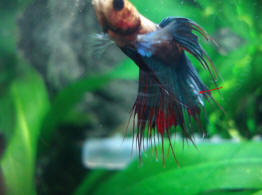 |
|
Lump on Betta 1/15/11
I have read several
posts regarding cysts, tumors, cancer, etc. and to be quite
honest, I feel a little overwhelmed and more confused than I did
when I started researching. I truly don't know what this lump
qualifies as on my Betta. It did happen overnight, appears to be
getting larger, very slowly however, and the appetite and
behaviour have not changed at all. I'm trying to prevent it
from getting bad enough that her appetite or behaviour do change.
Here is some information:
*Housing*
What size is your tank? 1 gallon
What temperature is your tank? 78 degrees Fahrenheit
Does your tank have a filter? No
Does your tank have an air stone or other type of aeration?
Yes
Is your tank heated? Yes
What tank mates does your Betta fish live with? None
*Food*
What type of food do you feed your Betta fish? Aqueon Natural
Betta Food How often do you feed your Betta fish? three pellets
twice daily
*Maintenance*
How often do you perform a water change? bi-weekly
What percentage of the water do you change when you perform a
water change?
All of it minus the little bit that she is transferred into-we
use this to make her acclimation easier and its proven to work
well.
What type of additives do you add to the water when you perform a
water change?
After letting the water sit for about 24 hours, we add Aqueon
Betta Bowl Plus.
*Water Parameters:*
Have you tested your water? No *Symptoms and Treatment*
How has your Betta fish's appearance changed? **I've
included a picture* strange lumps developed on her tail and
dorsal fins. They seem to be getting larger. They were the same
color as her scales at first, but as they grow, they get
whiter.
How has your Betta fish's behavior changed?
It hasn't--this is why we're confused. She still eats and
moves well.
When did you start noticing the symptoms?
Shortly after we treated her with Maracyn Two for a stomach
parasite.
Have you started treating your fish? If so, how? No
Does your fish have any history of being ill? No
How old is your fish (approximately)? 2 years
Your time and patience are much appreciated,
Bethany and Dustin
<Hello Bethany. This does indeed appear to be a benign cyst of
some sort.
They are not uncommon on Bettas, likely a combination of genetic
factors (inbreeding to produce fish with bright colours) makes
them more prone to such things. In the wild heavy metals and a
few other pollutants have been identified as causative agents as
well, but how these relate to aquarium conditions remains
unclear. In any event, these things happen, and while unsightly,
provided the tumours don't get in the way, they don't
seem to cause any real harm. There aren't any cures as such,
though sometimes these cysts clear up by themselves. Just as with
humans, most tumours are benign, but sometimes they're not,
and these can cause what we'd refer to as cancer. Because
Bettas rarely live for more than 4 years in captivity, and most
only half that long, cancer as such isn't a common cause of
mortality.
Cheers, Neale.>
|
|
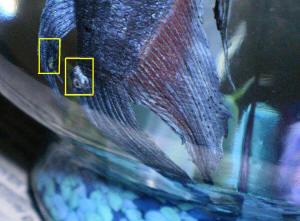
|
|
Re: Lump on Betta 1/16/11
Neale,
Thank you so much for taking the time to respond to me. I'm
sure that you are barraged with questions so it is much
appreciated. Take great care of yourself and have a wonderful
day!
Bethany
<Yes, Bethany, we are busy -- but we're also happy to
help! Cheers, Neale.>
|
|
Betta splendens tumor? 02/12/10
Hi, I'd like to get your opinion regarding a growth on a
Betta (pictures attached). I work at a pet store, and this Betta
came in with this growth.
It's not like any infection or disease I've ever seen
before. I'm thinking it's a tumor of some sort,
<I agree>
or perhaps something viral (it reminds me of a plantar wart I had
for several years, only blue).
<Many popular theories link viruses with/as tumors>
In any case, we couldn't sell him in this condition, but
since he appears otherwise healthy and I didn't want to
euthanize him, I adopted him. I just wanted to get a second
opinion on it. Have you seen anything like this before?
<I have>
Should I try any antibiotics, just in case it is bacterial, or
should I just leave him be?
<For myself, this last. IF you had several such specimens...
and particularly if you were a student of pathology... I might
excise this mass, do some culture, histological work...>
I'm leaning towards the second option, I prefer not to
medicate if it's not necessary.
Thanks for any input,
Tamla
<Thank you for sharing, caring Tamla. Bob Fenner>
|
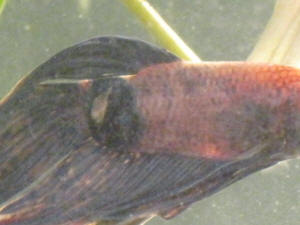 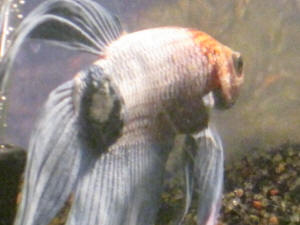 |
Sick Betta Fish 3/30/09
My Betta fish is three years old possibly older he's always been
very big. For the past few weeks a lump has been growing on the side of
his body above the anal fin toward the back close to the tail fin if
that makes sense. it's starting to grow in the same place on the
other side of his body. it's a silverish white-green color. Now he
is also sitting vertically in his tank breathing hard. He swims to the
top of the tank for air then sinks back to the bottom. He has some
brown stuff hanging between the two ventral fins, but I think that is
just poop. I don't know what to do. I clean his tank once a week,
and he's been eating the same food for three years. Please
help!?!
Thank you,br /> Jessie
<Hello Jessie. Three years is a very great age for Bettas, and my
assumption would be in this case that he's simply getting old and
"bits" of him aren't working as well as they did once.
Since the lump here is growing close to the tail fin, and by that I
assume further back the pelvic fins, it isn't going to be
constipation. For obvious reasons, constipation occurs in the abdomen
where the guts are, between the head and the pelvic fins. The part of
the body between the pelvic fins and the tail is all muscle. Any lumps
that develop there are likely to be cysts (which are harmless) or
tumours (which are not). There isn't much you can do about either.
Stringy faeces on the other hand can be (and usually are) caused by
constipation. Constipation is dealt with by abstaining from dried foods
(including freeze-dried foods) completely, and instead concentrating on
cooked (or tinned) peas, live daphnia, and live brine shrimp. All these
foods contain a lot of indigestible matter that helps clear out the
alimentary canal. In fact, Bettas generally are very prone to
constipation because of the limited diet and minimal physical exercise
most specimens get compared to their wild ancestors. So doing this
every few weeks for a week at a time is a good idea anyway. Cheers,
Neale.>
Betta fish question, tumour
11/24/08
Hi,
I believe that my beta fish has a tumor. There is a pea sized black
cauliflower looking growth on the bottom of his fin. He is still
eating
normally and acting himself. I found little on the internet about this
and I was wondering if there is anything I can do to help him. Is there
a cure?
Is this some sort of fungus? I did move his tank to a table next to a
window. Could this be the reason for this growth?
<Hello. Tumours are not uncommon on Bettas, perhaps because they are
so inbred. Environmental conditions may be a factor too: a lot of
Bettas are kept in marginal quality habitats, such as very small bowls.
So in terms of prevention, getting good quality stock and keeping him
in a heated, filtered tank around 5 or more gallons in size is the way
to go. Cure is more difficult; just as in humans, benign tumours come
and go at their own rate, and short of surgery there's not much you
can do to speed things up. Distinguishing tumours from Lymphocystis is
difficult; Lymphocystis is common among certain groups of fish.
Lymphocystis is a viral disease that causes (usually) off-white to
coffee coloured nodules or tumours with a distinctive cauliflower-like
texture. Again, there's no cure, and Lymphocystis tends to go away
by itself, albeit over a period of many months, even years.
Lymphocystis is likely caused by similar things to tumours, i.e.,
environmental conditions. Fungus is usually very obviously different:
it is fluffy, with white cotton-like threads and is usually associated
with obviously decaying skin or fin tissue. Cheers,
Neale.>
Betta with Ulcer 7/16/07 Hi,
<hello> I just found your site and saw you answered questions
about sick Bettas. My Betta has been sick for a while and I am getting
very desperate. I believe he has developed an ulcer on his side (at
least that's what they said when I brought him into the set store).
They gave me medicine and I was using the appropriate dose for about 3
weeks and one night he just got sooo much worse. He could only float on
the top and couldn't keep himself upright, only on his side. It
turns out his carbon filter was rendering the medicine inactive.
<Maybe, but sounds more like an environmental problem.> I took
out his filter and continued using the medication (BettaFix).
<Worthless, Tea Tree oil.> He initially seemed a lot better but
for almost a week has made no other progress. He still rests on his
side without moving and doesn't eat much. He looks uncomfortable
and struggles to keep himself upright and to move. I have tried
everything the pet store has recommended (very little) I have even
attempted to find a vet that will look at him (without luck).
<Almost impossible.> This fish really means a lot to me and is a
special part of me life. It is killing me that he is sick. Please any
suggestions would be greatly appreciated. Thank you, Lillian <95% of
all Betta problems are either genetic or environmental. In this case I
would guess environmental. In this case I would greatly step up water
changes, 50% every couple days and if the wound seems infected treat
with a broad spectrum anti-biotic. During treatment remove the carbon
and change the water often, as the bio-filter will likely be
destroyed.> <Chris>
Re: Betta with Ulcer Hey thank
you Chris for your response. <Welcome> I just wanted to let you
know what ended up working really well for my Betta with the ulcer. I
finally found someone at the pet store who knew what she was talking
about. She recommended using a medicine with Nitrofurazone,
Furazolidone and potassium dichromate in it. The brand Jungle sells a
product that is called "Fungus Clear" that has all of these
in it. It has worked great!! Everyday my Betta is getting better and
has recently begun eating again and the ulcer appears to be healing.
<Good> I had no idea about what to do and I'm sure other fish
lovers whose pets get ulcers will be writing you and I thought this
would be a good thing to let you know worked. Thank you. <Thanks for
sharing> <Chris>
|
Black bump under Betta skin 8/24/07 Thank
you all for everything you do, it has been extremely helpful!
<Welcome!> I've hunted the site and can't find
anything specific about this. <Lifetime's more to
add...> This question is about a friend's fish, a Betta,
about 1 year old. He's in a 2 gallon filtered, but unheated
tank (house is kept quite warm for an elderly resident).
<Needs to be consistent...> Water changes are about every 2
weeks and i forbade her feeding him more than a couple pellets a
day :) He gets bloodworms (dried) for a treat once in a while.
<Okay> I noticed last week that he had a black bump a bit
in front of his top fin, but didn't get a chance to look up
what it might be. This week I came over and bump is still there,
looking about the same. His behavior hasn't changed, still
eating, still swimming his usual patterns, still flaring for a
mirror. The bump is about half the size of my pinkie nail, on his
right side right at the top, sticking out around a sixteenth of
an inch (hard to tell through water). On his left side there is a
corresponding spot that is not raised, but is also darker than
normal. <Good description> I am including an unfortunately
not very focused pic ( he hates the camera, LOL ) but it does
show the size and color fairly well. This is the only altered
area I can find on him, everything else looks normal. Any help
you might provide would be helpful, and very appreciated. Sue
<Not much to actually "do" here... there are (more
and more frequent) "idiopathic" tumours appearing on
Bettas, other life... Is/are these an indication of "too
much stress", pollution in their/our environments? Bob
Fenner> Re: Black bump on Betta 7/25/07 OMG, I am
clearly a bit worried about this poor fish, so much so I forgot
to attach the pic I said I was sending!! This is in regard to the
Betta with a black bump in front of his top fin. <Does appear
to be "tumorous"... Only "treatable"
indirectly by good nutrition and environmental quality. BobF>
|
|
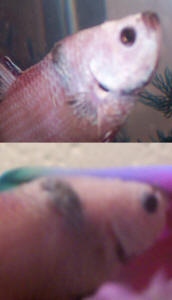
|
Re: Betta tumor part II: Lugol's Solution
03/18/07 Dear Crew (Bob?) <Michelle> Thank you for your
response. Can I administer the Lugol's solution (found it on-line)
to the 40 gallon tank, thus dosing all inhabitants (i.e. baby whale,
Corys, Otos, gouramis, tetras) or should I isolate the Betta &
treat him as an individual. I'd rather not isolate him if I
don't have to. Gratefully, Michelle <Can be administered to
all... BobF>
| Siamese Fighting Fish - Betta, tumour-
03/25/07 Hi there, <Rebekah> I have a male fighting fish
and I noticed about two weeks ago that he has a lump on the right
side of his body. <I see this> I went to the pet store and
they told me to put some Splendid Betta Anti Bacterial Remedy
<...> mixture into his water but it doesn't appear to
have helped at all. Splash has not lost his appetite at all and is
still very active. I have read in some of the FAQ that Betta's
can get tumors and constipation. <Yes... this is very likely one
of the former> I am wondering which of these it may be. I have
attached a photo which I took of him today and was just hoping that
you may be able to help me out? Cheers, Bek <Mmm, likely Epsom
Salt and hope is about all that can be done here... Please read:
http://www.wetwebmedia.com/FWSubWebIndex/saltusefaqs.htm
Bob Fenner> |
|
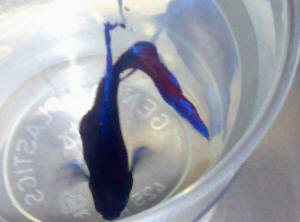
|
Betta question / can fish get cancer?
10/7/06 <<Good morning. Tom with you.>> Can fish get
cancer? <<Short answer? Yes.>> I've had my Betta since
May 2002. <<A long time in Betta-terms...>> He's had a
normal appetite and behaviors, but overnight, between his front side
fin.. in front of the fin and face (the part they can flare out)
there's a huge lump on the one side. <<I would venture that
this is not cancerous in nature but more likely the result of an
infection/abscess. Consider that cancer, in overly simple terms, is an
irregular/abnormal growth of cells. The host's body develops
(ironically) additional blood vessels to feed, and remove waste, from
these new cells. (When the "waste" removed from the growth
contains cells capable of duplicating similar growths elsewhere in the
body, the cancer is categorized as malignant. If not, it's
considered benign.) The point here is that such a development is
unlikely to occur "overnight" while a pathogenic infection
very well might produce the lump you've observed.>> He's
swimming upright, and eating, but appetite not as good as
yesterday/normal. He's swimming less (but if I didn't feel
good, I probably wouldn't either) he moves okay and his color is
still vibrant. With a sudden huge lump this got me wondering if a fish
can get cancer, or if he has another disorder in light of his age.
<<I would recommend treatment with a product such as Maracyn-Two,
which is effective against internal infections. Treatment is
best-performed in a hospital tank but I would guess that your Betta is
kept alone so this isn't as critical as it would be in a community
environment. Follow the directions very closely and pay attention to
any collateral effects such as cloudy water that might accompany its
use. Might answer some questions for you in advance.>> Thanks
<<You're welcome and good luck with your pet.
Tom>>
Update/reply on My Betta with a
"Tumor" - 10/10/06 Over the weekend, I re-set up a one
gallon heated & filtered hospital tank for my Betta and moved him
out of the community tank. The one gallon was his first home for almost
2.5 years with regular water changes. Only thing it doesn't have is
aeration/bubble maker, but with the labyrinth organ and clean water, I
hope that little detail won't be an issue. <<I like the move.
Should be easier on you and your Betta.>> His tank mates all
appear healthy including a couple of surviving molly fry, now about 3
weeks old and good at hiding in all the plants! I'm wondering if
perhaps Mr. Betta over indulged himself on fry in the last 3 weeks? He
has eaten plenty before without a problem. <<Easy for Bettas, as
with any fish, to over-indulge when the food supply is plentiful. One
of the leading causes of problems that we encounter is when Bettas have
been overfed.>> I've added the Maracyn-Two, but no apparent
changes in the lump. Since Mr. Betta is about 4+ years old, I'm
accepting the fact he's older than most, and his time to go may be
near. He's been a fun friend for sure. <<Sad as it is to
watch a pet approach its time, its nice to know that the experience of
caring for it was time well-spent and fun.>> The lump is a smidge
bigger today (I'm going to *try* and get a picture to email if I
can figure out how). He's been making a small bubble nest, took a
nibble on his Betta pellet and blood worms this morning, but definitely
listless and less appetite and activity from what was norm. Also,
whenever he got frightened a couple times in the past, his bottom fin
would turn whitish at the seam near his body.. and has intermittently
changed like that, so I think it's a sign he's not feeling
good. <<I agree. I dont know what it would take to frighten my
Betta since hes come to think that any activity around his tank means
chow time. In Mr. Bettas case, I think the age and health issues may
make him more skittish than youre used to seeing. If you havent already
done so, Id recommend keeping him in a very low-traffic area to keep
potential stress to a bare minimum.>> At this point, in light of
his advanced age, I'm pretty sure my little friend is going to
pass. Any suggestions in terms of "comfort measures" or what
I can do to make his transition to passing on as easy for him as
possible? <<I would normally recommend some aquarium salt for
Bettas but Im not sure it would be wise to attempt to acclimate him to
this at this stage. Salt does help with oxygen uptake and coming to the
surface for that occasional gulp of air may start to become more than
hes up to. Of course, keep the water clean and warm, which you already
know. And, other than keeping him away from possible stress factors, I
think youll have done as much as possible for him. Best regards,
Tom>>
Question about Humane Euthanization: -
10/13/06 <<Tom here once more.>> Mr. Betta is quite the
fighter, but I think what appears to be a tumor is not good. He swims
toward my finger when I put it near the tank and is happy to see me,
unfortunately, when he swims, it's in almost a "painful"
looking sideway motion (but he floats on top like normal) and cannot
seem to swim well. As mentioned in my previous messages (saying again
in case someone else is reading/answering this) he is 4 years old and
has lived a good life. His quality of life has obviously deteriorated
over the last 48 hours with no meaningful recovery foreseen, so I'm
wondering, is there something I could add to the water that would just
sedate him so he goes into a permanent sleep/passes away peacefully?
<<Id like you to take a look at this:
http://www.wisegeek.com/what-is-the-most-humane-way-to-euthanize-a-fish.htm.
Im very sorry that its come to this but there are times when ending a
pets life peacefully and painlessly is no less an act of kindness than
the loving care youve given for the last four years. Im a little more
saddened in your case because Ive yet to personally respond to anyone
whos had the wonderful fortune to keep a Betta as long as you have. My
very best to you. Tom>>
Update on Betta with a "tumor" -
euthanization question - 10/14/06 <<Hi, SK.>>
Thank you so much for link. The clove oil cost a little more than my
fish did a few years ago, but money well spent. I got your email in
time and after give him a couple of final blood worms which he slowly
nibbled, I added the clove oil. He kinda just sank to the bottom and
not moving, but I'm feeling assured he went peacefully. Added the
vodka to be sure the process was complete before sending him the final
journey down the toilet. After four years of enjoying such a neat fish,
I don't know I can ever find a Betta with the same personality.
After 4 yrs, I got pretty attached to him. Not as sad as losing a cat
or dog, but I never thought I'd have that heavy feeling inside me
over fish! He was a Wal-Mart brand veil tail. The original cup he came
in, dated May 2002 (that's how I figured/remembered when I got him)
for $2.95. I do have some pictures of him on my camera phone --
I'll share a few when I figure out how to transfer them from the
phone to the computer. <<If its not out of keeping, Im glad that
all went well. Im confident, as you are, that this was the appropriate
action to take. As I mentioned the last time, its really an act of
kindness and humanity.>> As for other fish-happenings, I started
my first aquarium earlier this year, with Mr. Betta being the first
inhabitant. Since then, I've enjoyed some Corydoras and, what I
first thought were platies, are gold dust mollies. I discovered one of
my mollies' is totally blind. She (was) losing weight and skinnier
than I had seen any other. I figured it was a personality quirk that
she was often alone in the tank, but noticed she doesn't follow my
finger, and at feeding time, just would repeatedly open her mouth
hoping food would drop in - but not actually seeing it like the others.
She had been surviving off feeder tablets and occasionally what fell
her in mouth! Poor thing. Her eyes look kinda funny, but attached photo
is her eating now - at feeding time I put a net up from under her (she
doesn't even see it coming) drop food in, and now her piggies of
tank mates get their own share but she gets hers. <<Im always
fascinated at the adaptability that fish, in general, possess. Amazing
creatures>> Even more interesting - my gold dust mollies were
female (and already pregnant) when I bought them - now one of them has
turned into a male! (I did quite a bit of web searching to make sure I
wasn't seeing or imagining things when that happened.)
<<Guess he figured that drinking beer in front of the TV was a
better way to go! :)>> I have a fry living in there, now for 3
weeks, but she's hard to take a picture of because she is solid
black - solid black from a gold dust molly????? I know they come in
many colors, but haven't been with others at the fish store/other
fish since about June or July of this year when I bought them.
<<Female Mollies can/will store semen for months, six to eight
months not being unheard of. For that reason, they can produce fry
without even having contact with a male but one time. Your Molly might
not have mated with another Gold Dust male which could explain the
difference in coloration. Theres also the issue of dominant/recessive
genes at play but lets not turn this into a biology lesson. :)>>
Thanks for letting me share my fish stories with expert enthusiasts who
appreciate my swimming friends :) <<Thank you for sharing them
with us, SK. We appreciate your friends just as we do our own.>>
SK <<Tom>>
Betta stomach bulge: could be dropsy, constipation, but most
likely a tumor 1/8/07 I have had my Betta for a year and a
half. Seven months ago he developed a bulge on one side. It grew to the
point where his scales were not covering it. This didn't seem to
bother him until recently. Now it seems the bulge has grown to the
other side and he seems listless. He also does not to seem to be
eating. Is there help for him or is it time to let him go? <Sounds
to me like it could be a tumor, especially since it was notably
asymmetrical at first. Couple of other things to rule out though,
namely dropsy and/or constipation...do his scales have a pinecone-like
appearance, especially if the fish is viewed from the top? If so, this
could be dropsy, which is usually a symptom of a internal bacterial
infection. Here's a picture of an fish with dropsy: http://www.fishjunkies.com/Diseases/dropsy.php Alternatively,
it could be constipation; have you ever tried fasting your Betta for a
couple of days, then feeding a frozen, then thawed pea or two (cut up
for the Betta's small stomach)? Also, Epsom salts are particular
effective in relieving fish constipation (and may assist if a build up
of fluid is present, as is the case with dropsy). However, I suspect,
based on your description, length of time the fish has been affected,
etc., that this is a tumor - these are really quite prevalent in the
Betta fish, perhaps due to the over breeding the species is subjected
to. Tumors aren't curable, and sadly, will likely cause the end for
an affected Betta one day. In the meantime, keep the fish comfortable
in appropriate conditions (i.e., isolated, especially in this
Betta's case, in a minimum 2-3 gal. filtered tank, with heater kept
stable at 80-82 degrees F, weekly water changes, etc.) Of course, try
to get your Betta to eat - what are you feeding him? Have you tried
frozen, then thawed bloodworms or small mysis shrimp? All my Bettas go
nuts for those foods. Also, you can use a drop or two of pure garlic
extract (either from the grocery store, or a product called Garlic
Xtreme, made by Kent) to soak his food in, and hopefully re-stimulate
his appetite. If all this fails, I'm sad to say his time may be
nearly up. I've lost a couple of Bettas over the years to what I
suspect are tumors... Once you've made a definite diagnosis of a
tumor, the fish can live a while, still eating and swimming. If, the
fish has stopped doing even these things, then it may be time, sadly,
to euthanize him; best method for that, in my opinion, if pure clove
oil...it simply puts the fish to sleep. I'll cross my finger for
your Betta - hopefully, at the very least, we can get him eating again.
Best regards, Jorie>
Betta, Growth On Body/Fin -
06/22/2006 2 years ago I inherited my Betta from a family member. I
knew nothing about fish and have been learning as I go along. Last
month I noticed a white spot on his body by his top fin, since then it
has grown into a bulge. <Possibly a tumor or granuloma....
relatively common on Bettas....> He still eats and his actions are
normal. I have tried adding a small amount of salt to his tank on the
advice of a friend and in the last week I have used Furan-2. The bulge
hasn't changed at all, it almost seems to be getting bigger. <If
it is a tumor or granuloma, it is unlikely to respond to any
treatment.> Any help or guidance you can provide would be greatly
appreciated. <Mostly, I urge you to maintain optimal water quality
for him - ammonia and nitrite ZERO, nitrate less than 20ppm, in a tank
of at the very least a couple of gallons.... Though I can't tell
you with any certainty what it is without seeing it or a good image of
it, it's my guess, from having seen so many Bettas with
growths/tumors like you describe, that this is something that will not
respond to medication. Fortunately, however, it may not affect his
health very adversely. Do keep a close eye on it.> Thank You, -Katie
<Wishing you well, -Sabrina>
| Betta With Tumor? 9/25/05 I have attached the two best
photo I can take of the area. Basically it is a tumor looking thing
on his lower right jaw area. I have bee searching like mad for
answers but have not had any results. He is not acting any
differently then he has for the past year that I have had him.
Still eats fine as long as the pieces are small. Seems to have a
had time getting larger food into his it is like he has lock jaw as
well. I you could point in some direction to help that would be
great. < It is an anaerobic infection under the skin the you
could try a combination of Metronidazole and Nitrofurazone. If it
is a worm type of parasite then you could try Clout or Fluke-tabs.
If is truly a tumor then no medication will help.-Chuck> Doug
Denny |
|
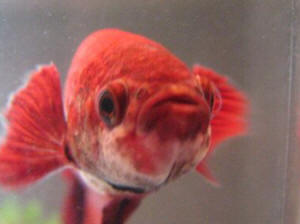 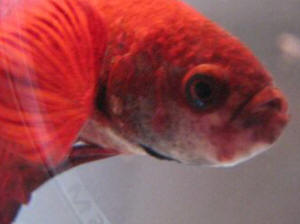
|
Do Bettas Get Tumors? - 09/03/2005 Hello There, <Hi.>
I've had my Betta for about 2 years and he's always been in
good health-- happy, moves around a lot, eats well, etc. and yet over
the past 2 weeks he has developed a strange growth by one of his eyes.
It started out as a whitish/gray dot, (I actually at first thought it
was a piece of food that had landed on him!) but then grew by the day
and is now a quite pronounced bubble-looking growth. Do Bettas get
tumors? <They can, yes.> What could this be? <Could be a tumor
or granuloma, could be Lymphocystis....> His behavior hasn't
really changed--he's still acting healthy--but I'm starting to
worry about whether his vision will soon be impaired (it's bubbling
out right over his eye) and I also think I might be detecting a small
white do on his back, which I worry will turn into the same growth.
I've been reading everywhere and can't seem to find out what
these symptoms mean. <Try a search on "Lymphocystis" and
be sure to maintain impeccable water quality, with nitrate as low as
possible. This viral disease is often beaten by improving water
quality, but is not otherwise treatable. Fortunately, it's very
rarely harmful or fatal. Other possibilities do include tumor(s),
mycobacteriosis....> Thanks for your time, I love my little guy so
much and am starting to get more than a tad concerned!
<Understandable. Unfortunately, as you describe it, it does not
sound like something easily "fixed" like a bacterial
infection. I would just maintain optimal water quality and continue to
give him great care. Sounds like he's in good hands.> -Erin
<Wishing you and your scaly pal well, -Sabrina>
Tumor-like growth on Betta Hello, <HI...Jorie here>
First I'd like to say your web page is very helpful and
informative. Thank you for making this resource available.
<You're welcome. I can honestly say that I learned almost
everything I know about aquariums and fishkeeping from this site, so I,
too, am grateful for it!> I've a Betta that has a problem. He
eats fine, but his demeanor is somewhat erratic. He startles easily at
times, makes darting grabs for his food and circles the bowl at speed.
<Hmmm...I'm not sure that this behavior by itself is odd for a
Betta, unless you've recently noticed a change. Bettas all seem to
have their own little personalities, and this doesn't sound unlike
some of the ones I've kept in the past.> He's developed a
swollen tumor-like growth on his side, discolored black and his tail is
diminished, also with black along its outer edge. Is there anything I
can do to treat him? <OK, this is obviously the sign of a problem.
First of all, have you tested the water you keep your Betta in for
ammonia, nitrite and nitrates? Also, a bit more info. would be
great...how big is the tank you keep him in, how long has it been set
up, what's the temperature of the water and also the pH, and does
he have any tankmates? With regards specifically to the growth, is it
symmetrical or not? Are his scales protruding? If so, that could be a
sign of dropsy, which is in fact a symptom of myriad diseases. Or, more
simply, the fish could be constipated...have you noticed if he's
pooping? If it is constipation, adding one or two tsp. of Epsom salt
per 5 gal. of water should help, along with trying to feed your Betta a
frozen, then thawed, pea (some go for it, some don't). You would
want to fast him for a few days prior to the pea, as well, which may
make it more enticing and should also help with the constipation. If
this is an asymmetrical lump, or tumor, as you said earlier, it could
also be a tumor. How long have you had this fish (how old is he, if you
know)? Many older Bettas (normal lifespan is between 2-3 years) do seem
to develop tumors as they age, and I have yet to find anything that
will cure it. As long as the affected fish is swimming normally, eating
normally, and generally looks OK, I think he's fine...it's when
the fish starts losing his appetite, laying on the bottom, etc., that I
would start to recommend euthanasia.> Regards, Lee Cutler <Hope
this information helps. If you can get back to me with a little bit
more info., I can better help you diagnose the problem, but right now,
it seems as though it could be one of several things. Good luck!
Jorie>
Re: Tumor-like growth on Betta Hi Lee, I'm trying to
envision what this growth looks like, and I'm having trouble, based
on your description. I don't think I've personally ever seen
anything like that. What I meant by "protruding scales" can
also be described as a "pinecone effect"...if you look at
your fish from the top, does he look like a pinecone? Doesn't sound
like it, from your explanations, but just wanted to clarify. I would
suggest you step up the water changes in that 1 gal. bowl...personally,
I'd suggest doing a 50% change 2 times per week, optimally. If you
can't do that, at the very minimum do a weekly change. Keep his
water clean and hopefully his "sore" won't get infected.
As I said earlier, if he's eating, swimming, pooping, etc.
normally, I think everything is OK. Perhaps this is yet another
manifestation of the tumor-phenomenon I've seen in older
Bettas...sadly, there isn't much you can do when that happens.
I'd like to do some research to figure out exactly what is causing
this in captive-bred and raised Bettas - maybe some genetic deficiency
resulting from overbreeding? Who knows...when I get some spare time, I
plan to investigate! Jorie
|
Odd lump on my Betta's tail Hi guys
<Rex> What a great resource for novices such as myself!
I've looked through your FAQs and bulletin boards and while
I've discovered similar questions about Bettas with lumps,
they've been on the fish's body rather than it's fin.
I hope I'm not wasting your time asking a PAQ... if so, feel
free to sigh deeply and point me to the appropriate answer!
<Will try> I've had Benny the (Betta) Fish for two
years now. He was named after a Mafiosi character - same
expression, same temperament ;-) I bought him when I arrived in
Australia and he's been my closest friend since. <Good
name, spiel!> He's lived in the same bowl (capacity approx
3.4 litres) and has not had any new objects or plants introduced
for several months. He lives alone and eats 3 to 4 bloodworms a
day. His water is kept at 28 degrees C and is totally changed
once a month (treated, stood, and brought up to temperature
before he's put back in it). In winter around a third of his
water is taken out and replaced each week, while in summer the
same amount tends to be lost through evaporation and replaced in
smaller amounts more regularly. <Okay... though the diet would
be better if more diversified> He seems happy (well, grumpy,
but you know what I mean) and still has an appetite. However,
over the past two weeks I've noticed a lump developing on his
tail fin. I first noticed it about the size of a pinhead, and
started him on a treatment of BettaFix (antibacterial, tea tree
oil based). However this has had no visible effect and in fact
the lump has grown... it seemed as though two smaller lumps grew
in the same vicinity and merged with the first one. I'm
attaching a pic to supplement my description. <A good
image> I'm concerned that whatever it is may grow towards
his body and adversely affect his vital organs, or his ability to
swim, or *gulp* kill him :'-( <Appears to be a
subcutaneous tumor of some sort... not likely fatal... though
your Betta is getting "older"...> As I said, I'm
in Australia, so some of the brand names referred to here are
unfamiliar. So if suggesting medication, please try to include a
description of the ingredients and/or their proper chemical names
(usually found on the bottle). Thanks so much for your help. Rex
<No medication per se suggested... other than amending the
fish's diet. Perhaps some prepared "Betta pellet"
foods, or adding some liquid "baby vitamins" (for
humans) to the bloodworms, may reverse this growths progress. Bob
Fenner>
|
|
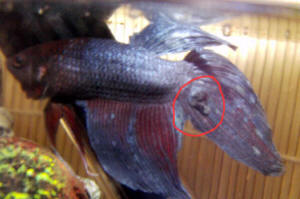
|
Lumpy Betta It could just be old age...I've had him over
1 1/2 years and I know they're often 1+ years old when they're
in the pet store. In any case, here's his history. Lex lives in a 2
gallon tank w/ some rocks on the bottom and a plastic plant (at first I
tried live plants but they died and mucked up his water). I've been
changing his water every 1-2 weeks and dechlorinating it. Shortly after
I first got him he developed fin rot but I gave him medicine and put a
heater in his tank and now he's been fine ever since. In the last 2
months I've gotten another beta and I've begun adding aquarium
salt (1/2 t) to each of their tanks. I keep them in separate tanks
right next to each other. At night I put a piece of card board between
they're tanks and feed them (3 beta pellets each). During the day I
take the card board away (between 3-4 days a week) so they can flare at
each other if they want. Lex continues to be active, eats voraciously
and always comes up to say hi when I'm there. About 3 months ago I
noticed a white spot on one of his fins so I put more medicine in his
water. The spot hasn't gone away but it hasn't increased in
size, multiplied or affected his behavior any. Then last night, when I
had a lamp on next to him, I noticed that he has a lump on his side
past his gills - it must've started to develop within the last 1
1/2 weeks - that's the last time I changed his water. Could it be
that the new beta is stressing him out? Could it be the addition of
aquarium salt? Could it be old age? What, if anything, can I do? Thank
You!!! <<Hello. The fin spot sounds like fish pox, or
Lymphocystis. . It is a viral infection that generally goes away on its
own. Probable cause is stress. Same with the lump. You could try
separating them to see if it helps. In any case, I don't think your
white spot is a parasitic problem, three months is too long for it to
be ich or any other parasite. One thing you should do is get both
tanks' water tested. If there are filters, test for nitrates, if
there are no filters, test for ammonia. High toxin levels can be a
serious cause of stress. Better yet, test both tanks for all three:
ammonia (should be zero), nitrites (should be zero), and nitrates (keep
as low as possible with waterchanges, like around 20ppm)
-Gwen>>
| Growth on female Betta I hope that you can
shed some light on a problem that I am trying to solve. My female
Betta has what looks like a growth that surrounds her right
pectoral fin. I have used Maroxy and Maracyn, both for 10 days, and
there is no change. <I see what I believe you are referring to.
Looks to be a sort of tumorous growth. Not likely to be affected by
external medications> Whatever it is has spread to her left
pectoral now and I am at a loss to figure out what it is and
whether it is a growth or something else that I can treat. Could
you please help? I have attached 3 digital pictures and I can send
more from different angles. Anthea <How old is this fish? Or,
how long have you had it in your care? This specimen does seem
pretty "girthy"... Does its ovipositor (like a white dot
at the vent) ever protrude? What do you feed your fish livestock?
Do you have any recent water chemistry, physical testing you can
relate to me? Like pH, hardness of the system water. The first line
of treatment here is nutritional... we will discuss this further.
Bob Fenner> |
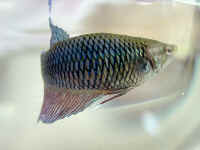 |
 |
 |
|
Re: growth on female Betta Bob, I am aware that bettas
do not generally live longer than 2 years or so, I do know people
who have had them for 5 - 9 years, believe it or not, an
exception to the rule *smile* <Yes... I washed Betta bowls for
two years (some involvement in the trade now! My hands are still
dish-panned...) back in the 60's overseas. We had a few
prized male breeders that were 4 to 5 years old> HBH do not
make any medicated foods and when I looked at the tetra site, I
was not sure which medicated food you were referring to. They
have bacterial/fungal and parasitic, which do you suggest I start
Morgana on? <The first, not the parasitic> Also, would it
be beneficial for her to include frozen or live food in her diet?
<Yes, even to soak same in vitamin, HUFA supplements for
fifteen minutes plus before offering> I try to feed them
within my financial means and I will find a way to obtain these
foods if it will benefit her. <Good> Returning to the
medicated foods, should I use Romet B or one of the tetra foods?
<I would utilize the Tetra antibacterial, ant fungal> Many
thanks again for your prompt response. Anthea <You are welcome
my friend. Bob Fenner>
Re: growth on female Betta Bob, From what I have found
out so far, the HUFA supplements are for marine life. Could I
rather use the Kent Zoe Freshwater supplement? <You could,
yes. Very similar> I have included an email link with a
variety of options if this one is not a good one. If you could
advise the best option I would appreciate it.
http://www.drsfostersmith.com/product/sc_view.cfm?siteid=6&pCatId=4245
<Thank you for this. In my order of preference: Multi-Vit,
Bio-Vit, Zoecon. Bob Fenner> Many thanks Anthea
|
Betta has "lump" and sinks Hello, I just ran
across your site and I am very impressed with all the knowledge.
<<Thank you very much!>> I have been looking for any
information that might help me in my quest. I have several Betta's
(mutts) from the pet store and they are doing fine but a friend has one
that I am baby sitting right now that has a lump on his side. I guess
the best way to describe it is it looks like someone shoved a pea down
his throat it sticks out really bad on one side and then just slightly
on the other side. He is eating very well but doesn't get off the
bottom of the bowl. I have been treating him for swim bladder but
it's now been 2 weeks without any change. <<The sitting on
the bottom sounds very consistent with swim bladder disorder but Im at
a loss on what would be causing the lump. If you could send me a
picture I may be able to tell more. If it is swim bladder disorder,
this is very hard to successfully treat. Generally, regardless of
treatment, the fish will continue to just rest on the bottom. However,
the fish can and often do live very happily even with this problem. I
had a female that lived for quite some time with it and she was one of
the happiest Bettas I ever had. She always displayed the best colors
and always got very excited whenever someone walked near her tank. I
did have to make sure to change her water quite often as it became
fouled very rapidly due to the low level I had to keep it at but that
was the only exception I ever made for her.>> I started him on a
treatment of AMPICILLEX with the hopes that it was something bacterial.
But no changes yet. <<Epsom salts has been used successfully in
some cases of SBD but most of the time there is nothing that can be
done. Its worth a try though, use the Google search box at the bottom
of www.wetwebmedia.com to search for either swim bladder or Epsom salts
for more info.>> I am keeping in a very small bowl with just
enough water to cover him plus about 1/2 an inch above him so he can
get to air. I am at a loss. He did come from one of the "Betta
death lily bowls" so I am not sure what kind of conditions he was
in all the time but I am sure they were not good as I saw the plant and
it was all full of fungus when she took him out. Any help could be
wonderful. <<Thank you (and your friend!) for rescuing him! These
lily vases are quite beautiful but I feel so sorry for the poor fish
that are kept in them. After reading this its possible that he has a
tumor of some sort due to the poor water quality that he was in before.
Still do send a picture if possible though.>> Thanks. Sandra
<<Youre welcome. Ronni>>
Re: Betta has "lump" and sinks After looking around
on your page some more I found a picture of exactly what this guy looks
like (except yours is a female. http://www.geocities.com/stariel25/sick.html
I will start with the Epsom salt in the a.m. and hope (and pray) that
does something. Wish I knew if this female in the picture survived.
Thanks, Sandra <<Hmm... Im still not positive even after seeing
the picture. :o( Its possibly just a side effect of the SBD so try the
Epsom salts and see if that helps. Sorry, I wish I could be of more
help! Ronni>> Re: Betta has "lump" and sinks
Hello, I just ran across your site and I am very impressed with all the
knowledge. <<Thank you very much!>> I have been looking for
any information that might help me in my quest. I have several
Betta's (mutts) from the pet store and they are doing fine but a
friend has one that I am baby sitting right now that has a lump on his
side. I guess the best way to describe it is it looks like someone
shoved a pea down his throat it sticks out really bad on one side and
then just slightly on the other side. He is eating very well but
doesn't get off the bottom of the bowl. I have been treating him
for swim bladder but it's now been 2 weeks without any change.
<<The sitting on the bottom sounds very consistent with swim
bladder disorder but I'm at a loss on what would be causing the
lump. If you could send me a picture I may be able to tell more. If it
is swim bladder disorder, this is very hard to successfully treat.
Generally, regardless of treatment, the fish will continue to just rest
on the bottom. However, the fish can and often do live very happily
even with this problem. I had a female that lived for quite some time
with it and she was one of the happiest Bettas I ever had. She always
displayed the best colors and always got very excited whenever someone
walked near her tank. I did have to make sure to change her water quite
often as it became fouled very rapidly due to the low level I had to
keep it at but that was the only exception I ever made for her.>>
I started him on a treatment of AMPICILLEX with the hopes that it was
something bacterial. But no changes yet. <<Epsom salts has been
used successfully in some cases of SBD but most of the time there is
nothing that can be done. It's worth a try though, use the Google
search box at the bottom of www.wetwebmedia.com to search for either
swim bladder or Epsom salts for more info.>> I am keeping in a
very small bowl with just enough water to cover him plus about 1/2 an
inch above him so he can get to air. I am at a loss. He did come from
one of the "Betta death lily bowls" so I am not sure what
kind of conditions he was in all the time but I am sure they were not
good as I saw the plant and it was all full of fungus when she took him
out. Any help would be wonderful. <<Thank you (and your friend!)
for rescuing him! These lily vases are quite beautiful but I feel so
sorry for the poor fish that are kept in them. After reading this
it's possible that he has a tumor of some sort due to the poor
water quality that he was in before. Still do send a picture if
possible though.>> Thanks. Sandra <<You're welcome.
Ronni>>
Betta has "lump" and sinks I thank you again for
your information. I am amazed and very thankful for your site, it is
incredible. I just have one small question. I am keeping this guy in
only about 1 cup of water total and how do I do a salt bath? Is there a
time frame as to how long he should or should not be in the salt?
Thanks, Sandra <<If you mean a salt bath with aquarium salt then
it should be done in a separate container and he should be left in for
3-5 minutes. If he starts looking overly agitated, take him out sooner.
If you mean the Epsom salts I'm not sure as I've never used it,
search www.wetwebmedia.com and you should be able to find the correct
procedure. Good luck! Ronni>>
- Brown Lump on a Betta - Hello, my name is Vanna, and I have
a question about my Betta Fish. <Hi, Vanna, JasonC here...> Well,
A couple of days ago I've been noticing a lump under my fish around
his fin area. Just recently the lump has gotten really big. It looks
brown and I think it's growing still. Maybe it's a parasite or
a fungus but I've been on sites and there's nothing that they
have that describes what my fish has. <Yeah, it's hard to find
data on 'a brown lump', but some other looking around leads me
to believe this might be a tumor of some type.> I don't know
what it is but I'm really worried about my fish. It lays on the
bottom of the tank and it's not really aggressive as it used to be.
<Depending on the nature of the growth, it may be moving in multiple
directions - inward and outward.> I fed my fish 3 pellets 3 times a
day. Sometimes it won't eat it all and other times it will. Now I
think I'm over feeding him so I'm only feeding him 3 pellets 2
times a day. He still blows bubbles so I don't know if he's
okay. I only had the fish for about 3 months, I got it on my birthday.
Well if you know what is wrong with my fish can you please help?
<Well... best to just keep on with the feeding and keep the water
quality tip-top. The lump may rupture revealing itself to be something
else, perhaps parasitic in nature that would respond to treatment, but
if it's a tumor there is no treatment for it.> I'm really
attached to this fish and I would like to help him because I know
it's not his time to go. Thank you. <Sorry to be the bearer of
no-so-good news. Cheers, J -- >
 |
New
Print and
eBook on Amazon
Betta Success
Doing what it takes to keep Bettas healthy long-term
by Robert (Bob) Fenner
|
|
|

